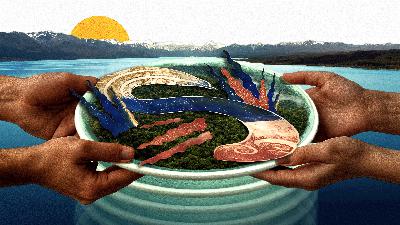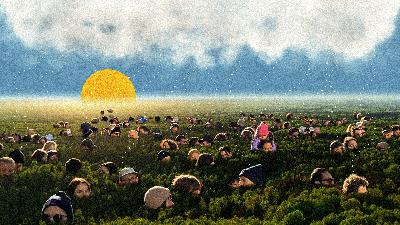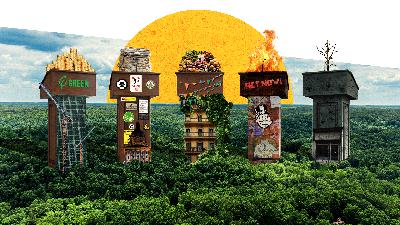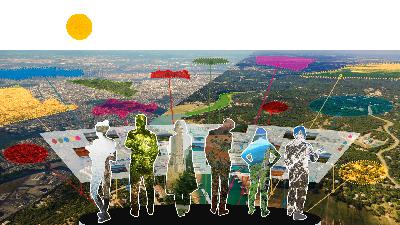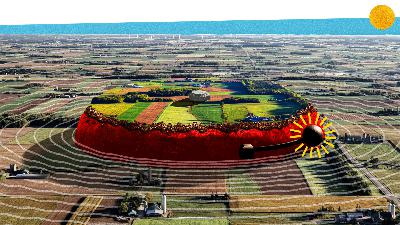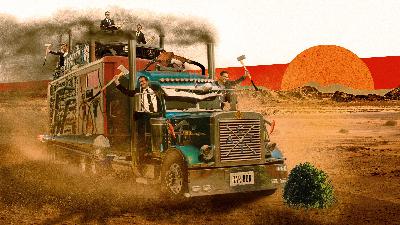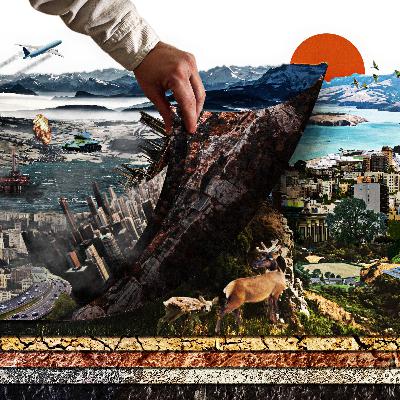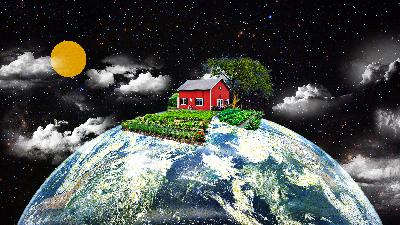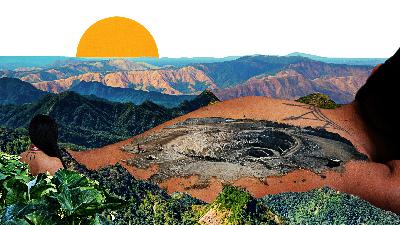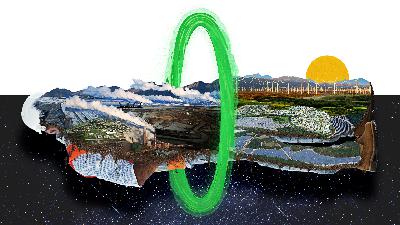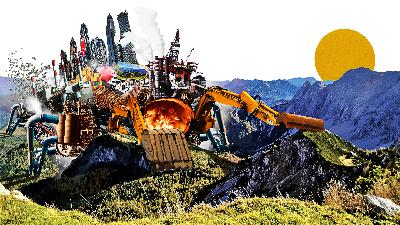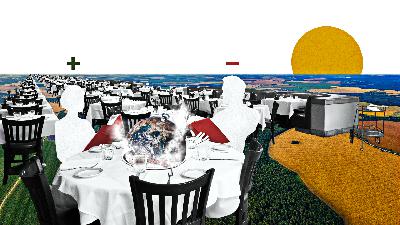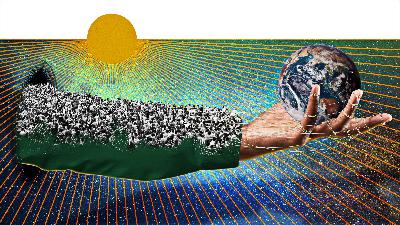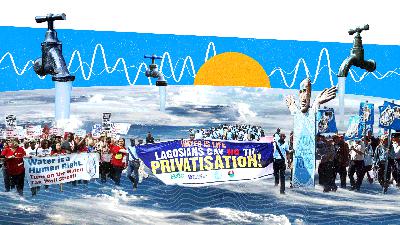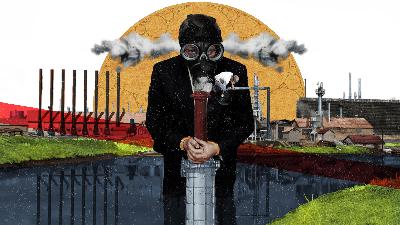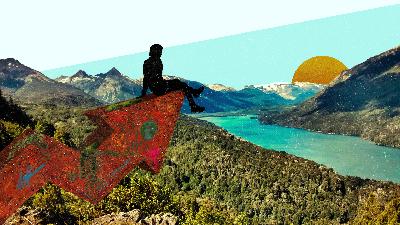Discover The EcoPolitics Podcast
The EcoPolitics Podcast

The EcoPolitics Podcast
Author: Peter Andrée and Ryan Katz-Rosene
Subscribed: 34Played: 471Subscribe
Share
© This work is licensed under a Creative Commons Attribution-NonCommercial-NoDerivs 2.0 Canada License.
Description
We’re back and excited to share where the Ecopolitics Podcast is going with Season 4. Hosts Peter Andree and Ryan Katz-Rosene reflect on where we’ve gone over the last three seasons. Together, they explore how many of the themes and topics of the podcast remain relevant and continuously changing, from the Carbon Tax and Sustainable Food Systems to Indigenous Environmental Politics. Tune in to hear Ryan and Peter introduce Season 4: Politics of the Anthropocene! We are excited to share a series of episodes that put today’s politics into the longer-term context of how our societies engage with the more-than-human world with expert insights, thought-provoking discussions, and practical solutions.
46 Episodes
Reverse
This episode is our second installment on the Living Relations partnership, focusing on transnational collaboration between Indigenous and settler partners from Canada and Aotearoa (New Zealand). Hosts Peter Andrée and Tehya Quachegan are joined by project co-director John Reid to share insights from members of its Indigenous Advisory Circle and Research Circle.
Building on the themes introduced in part 1, this conversation turns to the connections between land, water, and language; the role of Indigenous rights and governance in shaping climate-resilient futures; and the revitalization of food systems rooted in Indigenous values and knowledge. Together, the voices in this episode reflect on what it means to revitalize food systems through Indigenous governance, community-led research, and cross-cultural partnerships — and why revitalizing Indigenous food systems matters not only for Indigenous peoples but for all of us navigating the challenges of the Anthropocene.
In this episode, Peter Andrée and guest host Tehya Quachegan (Lakehead University) introduce listeners to the Living Relations Project, a collaboration between Indigenous and settler partners in Aotearoa New Zealand and Canada. The project brings together researchers, community activists, and Indigenous leaders to strengthen food sovereignty, address colonial legacies, and build resilience in the face of climate change and biodiversity loss.
Through stories and reflections from members of its Indigenous Advisory Circle and Research Circle, the episode delves into relationship-based research, intergenerational knowledge sharing, and the exchange of solutions across two similar yet distinct settler-colonial contexts.
In this powerful and personal episode, host Peter Andrée is joined by Dr. Jeff Ganohalidoh Corntassel (University of Victoria, Cherokee Nation) and Dr. James Rowe (University of Victoria, author of Radical Mindfulness) to explore how mindfulness, ceremony, and heart-centred practices offer resources for witnessing and metabolizing the emotional grief associated with environmental and social injustice.
Together, they discuss how inner awareness, land-based ritual, and work with psychedelic medicine can support healing and resilience in the face of climate anxiety, ecological grief, and systemic injustice. Drawing on Indigenous teachings, contemplative practice, and personal experience, this episode invites listeners to reflect on what it means to walk with feeling in ecopolitical spaces—and how relational and embodied approaches can help us build a more grounded, compassionate politics in the Anthropocene.
In this second half of our two-part series on The Growth-Environment Debate, Ryan and Peter explore two of the more provocative discourses in the debate over sustainability and economic growth. What if growth is the problem? And what if it's already too late?
First, they examine the “Overthrow Growth” discourse through the work of Indigenous activist and economist Winona LaDuke, the principles of degrowth, and the rise of eco-Marxist critiques of capitalism. Then, they delve into a final, sobering discourse: “The Damage of Growth is Done,” featuring voices like Jem Bendell, who argues that societal collapse is already underway, and that the focus should now be on adaptation and resilience.
This episode continues to unpack the diverse, and at times conflicting, visions for ecological sustainability and economic futures in the Anthropocene. If you haven’t listened to Part 1, we recommend starting there.
In this episode, host Peter Andrée sits down with two doctoral students and a postdoc on the path to becoming ecopolitical researchers: Devon Cantwell-Chavez, Kaleigh McIntosh, and Obed Asamoah. They talk about their unique projects, how they came to pursue this work, and unexpected lessons learned in graduate school. This episode explores the importance of relationships, humility, and a commitment to social and environmental justice for anyone seeking to become an ecopolitical researcher.
In the first of a two-part series, co-hosts Ryan Katz-Rosene and Peter Andrée dive deep into the complex and often controversial relationship between economic growth and environmental sustainability - the subject of Ryan’s recently published book! Kicking off with the story of Dennis and Dana Meadows and their landmark 1972 report, The Limits to Growth, the episode sets the stage for the "Growth-Environmental Debate" by exploring three major discourses: Growth is Green, Growth Can Be Green, and Growth Misses the Point. Through compelling storytelling and archival audio clips, Ryan shares with us the histories and intellectual trajectories of key figures such as Julian Simon, Mostafa Tolba, and Kate Raworth. From debates over population and scarcity to global environmental diplomacy and reimagining economics through the lens of doughnuts, this episode challenges listeners to reconsider how growth is understood, valued, and contested in environmental politics.
Join Dr. Peter Andrée as he explores the critical role of philanthropic organizations in advancing sustainability with two leading experts: Beth Hunter, Director at FoodBridge, and Lorne Johnson, Vice President at the IVEY Foundation. In this insightful conversation, Beth and Lorne share their expertise and experience, offering valuable insights for students, researchers, and anyone interested in the intersection of philanthropy and environmental responsibility.
Discover how successful philanthropic efforts can be aligned with ecological goals, such as promoting sustainable agriculture in Canada. Learn about the unique challenges and opportunities facing philanthropic organizations as they strive to create a more sustainable future for all.
In this episode of the Ecopolitics Podcast, our host, Dr. Ryan Katz-Rosene, is joined by Dr. Kathryn Harrison and Dr. Andrew Leach to delve into the intricacies of the federal carbon tax in Canada. We explore the mechanics of the carbon tax—how it sets a price on emissions and the variations in its application across provinces, and how the tax impacts consumers and add the context by examining the current political climate surrounding the carbon tax and its role in the larger debates on environmental policy in Canada. Listening to this episode will help us unpack the complexities of this politically contentious policy tool and its implications for Canadian politics and climate change initiatives.
We’re back and excited to share where the Ecopolitics Podcast is going with Season 4. Hosts Peter Andree and Ryan Katz-Rosene reflect on where we’ve gone over the last three seasons. Together, they explore how many of the themes and topics of the podcast remain relevant and continuously changing, from the Carbon Tax and Sustainable Food Systems to Indigenous Environmental Politics. Tune in to hear Ryan and Peter introduce Season 4: Politics of the Anthropocene! We are excited to share a series of episodes that put today’s politics into the longer-term context of how our societies engage with the more-than-human world with expert insights, thought-provoking discussions, and practical solutions.
In this episode, we delve into the world of climate intervention and geoengineering, specifically focusing on solar geoengineering, also known as solar radiation modification (SRM). Host Ryan Katz-Rosene as he explores the complexities of this technology with two leading experts. First, we hear from Dr. Pete Irvine, as he breaks down the science behind SRM, particularly stratospheric aerosol injection (SAI), and discusses the potential benefits and risks, and addresses the current state of research and the ongoing debate surrounding field experiments. Then, we shift gears to hear from Dr. Aarti Gupta, who provides a crucial counterpoint, highlighting the voices of many in the academic community and beyond who are deeply concerned about the potential deployment of solar geoengineering. She emphasizes the growing opposition from the Global South, the disproportionate impact concerning vulnerable nations and Indigenous communities, and the governance challenges that this technology presents.
Does the environmentalist motto, ‘Think Globally, Act Locally’, point us towards sustainable food systems’ solutions? In this episode, Dr. Navin Ramankutty from UBC and Ken Meter from the Crossroads Resource Center in Minneapolis explore whether locally produced foods, provided by small-scale farmers, are inherently more sustainable than that which comes from larger producers many miles away. The discussion suggests that scale and proximity are not necessarily correlated with better environmental performance across the board, but that there are still good reasons for building strong food systems at the community level, and ensuring that small scale farmers can earn a sustainable livelihood.
Mining is an essential component to our everyday lives, providing us with the raw materials we need to create a wide variety of products. However, while mining contributes to our technological progress, it comes with an often hidden dark side rife with environmental and human rights abuses. When more than 60% of the world's mining companies are based in Canada, what does this mean for us as everyday ecocitizens? What responsibilities do we have with respect to holding these companies to account for their use and abuse of people and planet? These are some of the questions we drill into today with guests Chandu Claver, International Spokesperson for the Cordillera Peoples' Alliance, Teresa Kramarz, Associate Professor at the University of Toronto, and Sheri Meyerhoffer, Canadian Ombudsperson for Responsible Enterprise (CORE).
Climate change and its impacts on the economy, the planet, and, of course, us, is top of mind for a lot of folks these days. One potential solution that merges economic and climate needs is the transition away from fossil fuels as an energy source, to greener options. But with so many people relying on the fossil fuel industry for their livelihoods, how do we ensure a transition to a whole new energy source is just? This is one of the many questions we touch on in today's episode. Our guests, Luisa Da Silva, Executive Director of Iron and Earth, and Heather Milton-Lightening, a long-time Indigenous climate activist and current student, share with us their different views on just transition, and what we need to consider if we're really going to make it work.
How do we confront capitalism's ecological record? In this episode we get some answers from Dianne Saxe (Deputy Leader of the Green Party of Ontario), and Professor Matt Huber (Syracuse Univer“How do we confront capitalism’s ecological record?” In today's episode, we tackle this question with help from Dianne Saxe, President of SaxeFacts, and Deputy Leader of the Green Party of Ontario and Matt Huber, Professor in the Department of Geography and the Environment at Syracuse University. From two unique perspectives -- that of an environmental lawyer and a Marxist Geographer -- we dig into the ways in which capitalism is implicated in climate change, and how capitalistic forces might be influenced for the betterment of people and planet.
To consume or not consume meat? That is the question plaguing many an environmentally conscious person as we grapple with our personal responsibilites in the face of a warming climate. However, as our guests Paige Stanley, PhD Candidate at the University of California, Berkeley and Tara Garnett, Director of TABLE, a platform for informed discussion about food systems at University of Oxford point out, the answer isn't so black and white. In today's episode, we dive into the nuances of protein production, exploring both the macro and micro ways that farmers, scientists, and everyday people are tackling sustainable food systems. Ultimately, we strive to answer the question: Can we truly eat our way to sustainability?
What is eco-citizenship and what does it entail? These are the overarching questions that guide this episode's discussions with Manvi Bhalla, Graduate Student and Co-Founder of Shake Up The Establishment & missINFORMED, and Kimberly Nicholas, Associate Professor of Sustainability Science at Lund University. From an introduction to intersectionality and its importance in climate justice action, to the Eat Lancet Report's rough guidelines for how to reduce one's carbon footprint, this wide-ranging discussion explores all the facets of what it means to be an eco-citizen, and who bears the most responsibility for taking action to slow climate change.
Just over a decade ago, the world’s urban population surpassed its rural population in a trend of urbanization that is expected to continue for decades to come. This trend has raised some interesting questions with respect to how cities can participate in global sustainability efforts and how they might have a say in the governance of environmental politics. In this episode, we dive into these questions with Dr. Harriet Bulkeley, Professor in the Department of Geography at Durham University and at the Copernicus Institute of Sustainable Development at Utrecht University.
Recorded on World Water Day, in this episode, we speak with Dr. Farhana Sultana, Associate Professor in the Department of Geography and the Environment and the Maxwell School of Citizenship and Public Affairs at Syracuse University to discuss all things water. Our conversation touches on the human right to water and sanitation, the ways in which water is a cross-cutting, multisectoral entity, and how governance of water, and further, privatization, is complicated, and can often be detrimental, to ensuring our rights to water.
In this episode, which is a re-broadcast of an episode from Season 1, we speak with Steven Bernstein, Distinguished Professor of Global Environmental and Sustainability Governance, University of Toronto, and Matthew Hoffmann, Professor of Political Science, University of Toronto, about carbon lock-in (the ways in which our culture currently reinforces our use of fossil fuels) and two different metaphors for thinking about how we might challenge the carbon lock-in mindset both locally and internationally.
What is the relationship between economic growth and the environment? What is 'green growth' and why does the degrowth movement oppose it? And what does it mean to be agnostic about growth in the context of sustainability? In this episode we speak with two scholars who approach these questions from a degrowth perspective - Dr. Susan Paulson from the University of Florida, and Dr. Bengi Akbulut, from Concordia University in Canada. The episode also delves into Global South perspecitves on the growth-environment debate.


